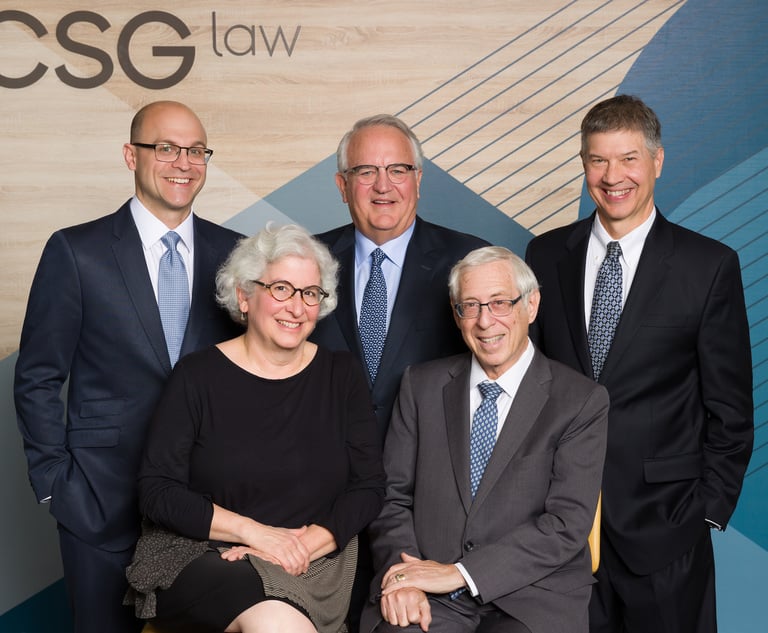No Presumption of Privacy for Those Winning Public Auctions, Court Holds
In a unanimous ruling, the court, overturning the Appellate Division, said persons who purchase seized items from public agencies may have their names and addresses released under the state's Open Public Records Act.
May 24, 2018 at 10:21 AM
3 minute read
 New Jersey Supreme Court Chief Justice Stuart Rabner
New Jersey Supreme Court Chief Justice Stuart Rabner
The New Jersey Supreme Court on Wednesday ruled that successful bidders at public auctions are not entitled to a presumption of privacy.
In a unanimous ruling, the court, overturning the Appellate Division, said persons who purchase seized items from public agencies may have their names and addresses released under the state's Open Public Records Act.
The case involves 39 people who claimed they purchased sports memorabilia items that were being auctioned off by the Bergen County Prosecutor's Office after the items were seized by law enforcement. But the items turned out to be counterfeit, the plaintiffs alleged.
John Molinelli, the Bergen County prosecutor at the time, said the counterfeit items were to be destroyed to avoid winding up in the hands of unsuspecting collectors.
Good-government activist William Brennan sought to obtain the names and home addresses of those who won the bids. Brennan had contended the prosecutor's office knowingly allowed counterfeit memorabilia to be auctioned.
The Bergen County Prosecutor's Office responded to Brennan's public records request by concluding that the information sought was exempt from OPRA. The Appellate Division agreed.
Brennan appealed, and Chief Justice Stuart Rabner, writing for the court Wednesday, said the successful bidders had no reasonable expectation to privacy.
“OPRA favors broad access to public records,” Rabner said. “A party must present a colorable claim that public access to records would invade a person's reasonable expectation of privacy,” Rabner said.
“It is not reasonable to expect that details about a public auction of government property—including the names and addresses of people who bought the seized property—will remain private,” Rabner said.
“OPRA does not contain a broad-based exemption for the disclosure of names and home addresses that appear in government records,” the chief justice added.
“The bidders knew they were participating in a public auction,” he said. “And the participants knew they were biding on seized property forfeited to the government.
“Forfeiture proceedings and public auctions of forfeited property are not conducted in private,” Rabner said.
Rabner held that courts need not examine factors for and against disclosure set forth in the Supreme Court's 1995 ruling in Doe v. Poritz each time a party attempts to invoke a privacy interest. He distinguished Supreme Court cases where the Doe factors were consulted—Burnett v. County of Bergen and Carter v. Doe, from 2009 and 2017, respectively—saying that neither one “requires courts to analyze the Doe factors every time a party asserts that a privacy interest exists.”
Brennan's attorney, Donald Burke Jr., issued a statement in response to the ruling.
“We are grateful the Court, in its unanimous opinion, reaffirmed its commitment to OPRA's fundamental principles. Democracy thrives on transparency. Today is a great day for openness and accountability,” said Burke, who heads a firm in Toms River.
The Bergen County Prosecutor's Office had opposed Brennan's OPRA request. Its attorney, Craig Bossong of Florio, Perrucci, Steinhardt & Faber, didn't return a call seeking comment.
Brennan, a former firefighter, ran an unsuccessful gubernatorial campaign last year and made headlines when he filed a suit against then-Republican Gov. Chris Christie over the so-called Bridgegate scandal. That suit ultimately was thrown out.
This content has been archived. It is available through our partners, LexisNexis® and Bloomberg Law.
To view this content, please continue to their sites.
Not a Lexis Subscriber?
Subscribe Now
Not a Bloomberg Law Subscriber?
Subscribe Now
NOT FOR REPRINT
© 2024 ALM Global, LLC, All Rights Reserved. Request academic re-use from www.copyright.com. All other uses, submit a request to [email protected]. For more information visit Asset & Logo Licensing.
You Might Like
View All
Appellate Div. Follows Fed Reasoning on Recusal for Legislator-Turned-Judge
4 minute read
Chiesa Shahinian Bolsters Corporate Practice With 5 From Newark Boutique
5 minute read
On the Move and After Hours: Brach Eichler; Cooper Levenson; Marshall Dennehey; Archer; Sills Cummis
7 minute read
'A Mockery' of Deposition Rules: Walgreens Wins Sanctions Dispute Over Corporate Witness Allegedly Unfamiliar With Company
Trending Stories
- 1Former Wamco Exec Charged With $600M 'Cherry-Picking' Fraud
- 2Stock Trading App Robinhood Hit With Privacy Class Action 1 Month After Alleged Data Breach
- 3NY High Court Returns Fired Priest's Discrimination Claim to State Agency
- 4Digging Deep to Mitigate Risk in Lithium Mine Venture Wins GM Legal Department of the Year Award
- 5Reminder: Court Rules and Statutes Apply to Pendente Lite Custody Decisions
Who Got The Work
Michael G. Bongiorno, Andrew Scott Dulberg and Elizabeth E. Driscoll from Wilmer Cutler Pickering Hale and Dorr have stepped in to represent Symbotic Inc., an A.I.-enabled technology platform that focuses on increasing supply chain efficiency, and other defendants in a pending shareholder derivative lawsuit. The case, filed Oct. 2 in Massachusetts District Court by the Brown Law Firm on behalf of Stephen Austen, accuses certain officers and directors of misleading investors in regard to Symbotic's potential for margin growth by failing to disclose that the company was not equipped to timely deploy its systems or manage expenses through project delays. The case, assigned to U.S. District Judge Nathaniel M. Gorton, is 1:24-cv-12522, Austen v. Cohen et al.
Who Got The Work
Edmund Polubinski and Marie Killmond of Davis Polk & Wardwell have entered appearances for data platform software development company MongoDB and other defendants in a pending shareholder derivative lawsuit. The action, filed Oct. 7 in New York Southern District Court by the Brown Law Firm, accuses the company's directors and/or officers of falsely expressing confidence in the company’s restructuring of its sales incentive plan and downplaying the severity of decreases in its upfront commitments. The case is 1:24-cv-07594, Roy v. Ittycheria et al.
Who Got The Work
Amy O. Bruchs and Kurt F. Ellison of Michael Best & Friedrich have entered appearances for Epic Systems Corp. in a pending employment discrimination lawsuit. The suit was filed Sept. 7 in Wisconsin Western District Court by Levine Eisberner LLC and Siri & Glimstad on behalf of a project manager who claims that he was wrongfully terminated after applying for a religious exemption to the defendant's COVID-19 vaccine mandate. The case, assigned to U.S. Magistrate Judge Anita Marie Boor, is 3:24-cv-00630, Secker, Nathan v. Epic Systems Corporation.
Who Got The Work
David X. Sullivan, Thomas J. Finn and Gregory A. Hall from McCarter & English have entered appearances for Sunrun Installation Services in a pending civil rights lawsuit. The complaint was filed Sept. 4 in Connecticut District Court by attorney Robert M. Berke on behalf of former employee George Edward Steins, who was arrested and charged with employing an unregistered home improvement salesperson. The complaint alleges that had Sunrun informed the Connecticut Department of Consumer Protection that the plaintiff's employment had ended in 2017 and that he no longer held Sunrun's home improvement contractor license, he would not have been hit with charges, which were dismissed in May 2024. The case, assigned to U.S. District Judge Jeffrey A. Meyer, is 3:24-cv-01423, Steins v. Sunrun, Inc. et al.
Who Got The Work
Greenberg Traurig shareholder Joshua L. Raskin has entered an appearance for boohoo.com UK Ltd. in a pending patent infringement lawsuit. The suit, filed Sept. 3 in Texas Eastern District Court by Rozier Hardt McDonough on behalf of Alto Dynamics, asserts five patents related to an online shopping platform. The case, assigned to U.S. District Judge Rodney Gilstrap, is 2:24-cv-00719, Alto Dynamics, LLC v. boohoo.com UK Limited.
Featured Firms
Law Offices of Gary Martin Hays & Associates, P.C.
(470) 294-1674
Law Offices of Mark E. Salomone
(857) 444-6468
Smith & Hassler
(713) 739-1250






